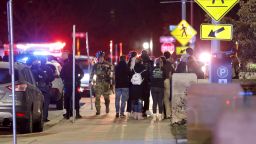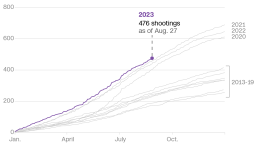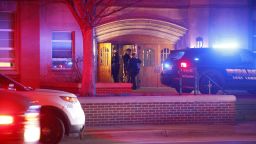Authorities identified the gunman in the deadly mass shooting at Michigan State University as 43-year-old Anthony Dwayne McRae. Here’s what we know about him:
MSU shooter pleaded guilty to firearm charge in 2019, court records show
The gunman in the Michigan State University shooting previously pleaded guilty to a firearm charge.
McRae was arrested in 2019 and charged for carrying a concealed weapon without a permit, a felony. He later pleaded guilty to a misdemeanor for possession of a loaded firearm and spent a year and a half on probation.
Around 2 a.m. on June 7, 2019, according to court records, a Lansing Police Department officer saw McRae sitting on the back steps of an abandoned building smoking a cigarette. The officer, who was patrolling the area after burglaries in the vicinity, asked McRae if he had any weapons, and McRae said that he did.
The officer patted McRae down and confirmed that he had a loaded semi-automatic pistol in his pants pocket, as well as another magazine for the gun in his breast pocket.
McRae admitted that he did not have a concealed pistol license, and the officer arrested him. McRae told the officer he carried the gun for his safety and was trying to obtain a permit. The officer confirmed the gun was registered to McRae, according to court records.
A lawyer for McRae initially argued that the officer lacked probable cause to search him. But in November 2019, McRae pleaded guilty to possession of a loaded firearm as part of a plea agreement. McRae agreed to forfeit the gun involved in the case and was banned from owning weapons during his probation.
McRae was originally sentenced to a year of probation, but that was later extended to a year and a half. McRae was discharged from probation in May 2021, the court records show.
McRae’s sister says he was socially isolated
Melinda McRae, the gunman’s sister, told CNN she was “shocked” by the news and said she had “no idea” what motivated her brother to carry out the shooting.
McRae had long been socially isolated and clashed with his parents, though she said they had a loving home growing up. He had recently been living isolated in a room at their father’s home, she said.
She said McRae would often lash out at their mother, and then when she died in 2020, he would express deep sorrow and say, “I’m sorry mom, I’m sorry …”
“My mom said that Anthony is going to be the death of her,” she said, referring to his social hostility. “He’s always been like the oddball of the family. But he’s been taken care of. My parents took care of us.”
Melinda McRae said her brother was also prone to transience, would sporadically leave town and struggled to hold down jobs. “He would leave the state. He would keep leaving my mom and dad …”
At times he would go “to different cities and just live in a shelter,” she said.
Melinda McRae said she last saw her brother at their mother’s funeral in 2020.
“I’m just so sorry about the innocent people that got killed,” she said.
McRae became ‘evil angry’ following his mother’s death two years ago, his father says
McRae was “a mama’s boy” who was “totally lost” and became bitter, isolated and “evil angry” after his mother died from a stroke, according to his father, Michael McRae, who spoke to CNN by phone in an interview Tuesday morning.
“Ever since my wife died, my son began to change,” Michael McRae said. “He was getting more and more bitter. Angry and bitter. So angry. Evil angry … He began to really let himself go. His teeth were falling out. He stopped cutting his hair. He looked like a wolf man.”
Anthony McRae lived with his father in a small house in Lansing, Michigan. His father said his son had trouble holding down a job and wasn’t employed, but had worked for about seven years previously at a warehouse loading refrigerators into trucks.
Michael McRae said about 30 police officers came to his house and went through his son’s bedroom following the shooting, which left three dead and five others wounded. “Tore it all up,” he said. “Picked up the mattress.”
Michael McRae said his son grew reclusive when his mother, Linda, died. “He didn’t care about anything no more. And he wouldn’t talk to me or anyone,” he said, explaining that the son would stay in his bedroom for hours on end playing video games. “He only came out to go to the kitchen or go to the bathroom, then he’d go right back in,” the senior McRae said.
McRae said his son’s moods would turn quickly. “I don’t know what happened to make him turn like this,” he said. McRae said when his son would get angry he wouldn’t speak to his father. “He’d treat me like I was invisible. I’d ask – ‘why are you treating me this way? What did I do?’”
“I told him, ‘you need help,’” Michael McRae said, suggesting he go to see a doctor, but his son refused.
“He got mad if I tried to get him help,” he said. “I was trying to help him. He’d close the door. He stayed in his room a lot.” Michael McRae said he didn’t talk to anyone officially. “I didn’t want to start trouble – he’d get mad at me.”
Michael McRae said his son “had demons inside him,” explaining that “sometimes evil can jump in you. You have to pray.” The father said he went to church every Sunday, but that his son did not attend regularly.
Michael McRae called his son “a bad apple,” explaining that he “was a good kid before my wife died.” But after she died, he said, he “was lost. Totally lost.”
Michael McRae said his son had had a gun several years ago, but police had taken it away. He said he believed his son had obtained another gun, but kept it in his room, and denied to his father that he had it.
This is a developing story and will be updated.









